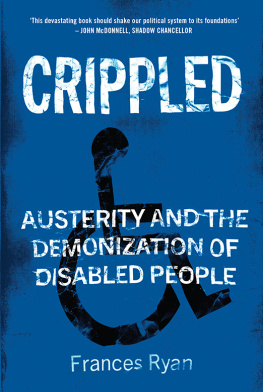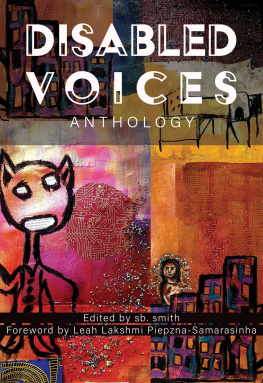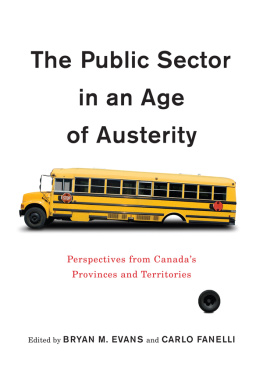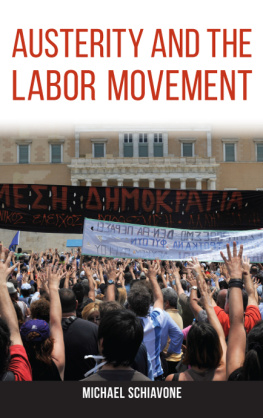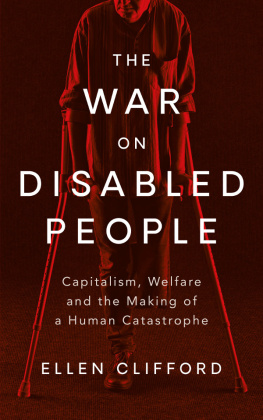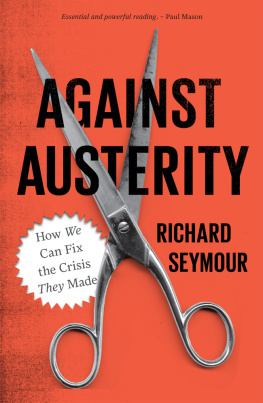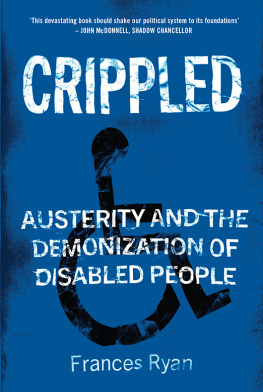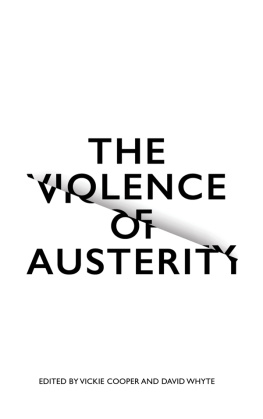Contents
This eBook is licensed to William Yang, williamyang1997@hotmail.com on 07/26/2019
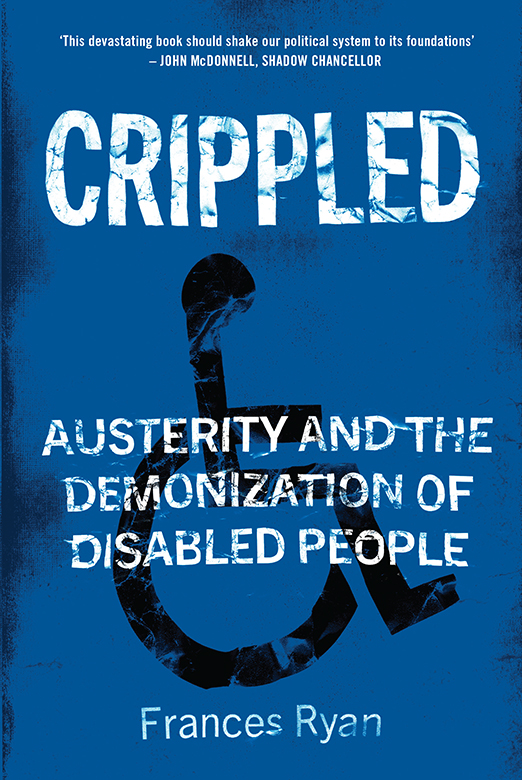
CRIPPLED
This eBook is licensed to William Yang, williamyang1997@hotmail.com on 07/26/2019
CRIPPLED
Austerity and the Demonization
of Disabled People
Frances Ryan

This eBook is licensed to William Yang, williamyang1997@hotmail.com on 07/26/2019
First published by Verso 2019
Frances Ryan 2019
All rights reserved
The moral rights of the author have been asserted
1 3 5 7 9 10 8 6 4 2
Verso
UK: 6 Meard Street, London W1F 0EG
US: 20 Jay Street, Suite 1010, Brooklyn, NY 11201
versobooks.com
Verso is the imprint of New Left Books
ISBN-13: 978-1-78663-788-8
ISBN-13: 978-1-78663-789-5 (UK EBK)
ISBN-13: 978-1-78663-790-1 (US EBK)
British Library Cataloguing in Publication Data
A catalogue record for this book is available from the British Library
Library of Congress Cataloging-in-Publication Data
Names: Ryan, Frances, author.
Title: Crippled : austerity and the demonization of disabled people / Frances Ryan.
Description: Brooklyn : Verso, 2019.
Identifiers: LCCN 2019007281 | ISBN 9781786637888 (paperback) | ISBN 9781786637895 (UK ebk) | ISBN 9781786637901 (US ebk)
Subjects: LCSH: People with disabilities Government policy Great Britain. | People with disabilities Services for Great Britain. | BISAC: POLITICAL SCIENCE / History & Theory. | POLITICAL SCIENCE / Civics & Citizenship.
Classification: LCC HV1559.G7 R93 2019 | DDC 362.4/04560941 dc23
LC record available at https://lccn.loc.gov/2019007281
Typeset in Adobe Garamond Pro by Hewer Text UK Ltd, Edinburgh
Printed and bound by CPI roup (UK) Ltd, Croydon CR0 4YY
This eBook is licensed to William Yang, williamyang1997@hotmail.com on 07/26/2019
For Mum, Dad, and Kate
This eBook is licensed to William Yang, williamyang1997@hotmail.com on 07/26/2019
Contents
This eBook is licensed to William Yang, williamyang1997@hotmail.com on 07/26/2019
The book would not have happened without my editor at Verso, Leo Hollis, whose confidence in me helped transform a notebook of ideas into a book on a shelf. My agent, Diana Beaumont, has offered invaluable support throughout. Im also very grateful to the K Blundell Trust and the Society of Authors for their grant and faith in the project.
A number of experts have contributed helpful advice, including Ellen Clifford and Disabled People against Cuts, Ben Baumberg Geiger, Michelle Cardno at Fightback4Justice, and many more. Charities such as Contact, Scope, Leonard Cheshire, Action for Children, Changing Lives, the Joseph Rowntree Foundation, DeafHope, SafeLives and Refuge have similarly generously offered their time to be interviewed, track down sources, or bat around ideas.
I have been very lucky to have the support of family and friends who, in multiple ways, helped me complete this book at a challenging time in particular Dave Drew, Aisling Wootten, Marie Staniforth, Sarah Raddon Jackson, Helen McCulloch and Sarah Monk. As ever, my love and thanks for everything to Mum, Dad, and sister, Kate.
This book was in many ways the accumulation of six years work covering disability and austerity, started long before I envisaged writing a book or there being an interest in publishing it. In light of that, thank you to the editors and colleagues who over the years have offered anything from early commissions or advice to the encouragement that helped me get here in particular, Kira Cochrane, Amelia Gentleman, Alison Benjamin, Patrick Butler and Helen Lewis.
It was with more than a little irony that, just as I embarked upon writing a book about disability, my own disability took a considerable downturn. Writing became impossible for much of the time and, when possible, was slow and stagnated. There were times when I did not know if Id physically be able to get this book out. And yet I was incredibly fortunate. I had a family that meant I never needed to worry about keeping a roof over my head and a flexible job that meant I could work and therefore earn a wage from my bed. Countless others do not. It is here that my appreciation for the welfare state is only encouraged. To have a safety net to protect us when we are sick is the most precious of things and a sign of civilization we shall surely miss if its gone.
Since I began working on this subject in 2012, many hundreds of disabled people have taken the time to write to me about their experiences. These tweets, letters and emails were fundamental in shaping the work that followed. Above anyone, I would like to thank the disabled people who agreed to be interviewed for this book. I am deeply aware how exposing and difficult it often was to relay some of the most intimate parts of their lives, and the bravery it took to share that publicly. I thank them for their trust and hope this book does them justice.
This eBook is licensed to William Yang, williamyang1997@hotmail.com on 07/26/2019
In the closing stages of 2015, it emerged the United Nations was quietly carrying out an inquiry into state-level violations of disabled peoples human rights. It was the first of its kind: a secret investigation into the harm a government was allegedly inflicting on its disabled citizens. Initial reports included some distressing accounts from disabled people and their families. The UN insisted on conducting proceedings in private, stating that confidentiality was necessary to protect witnesses and to secure the co-operation of the host country.
It would be easy to assume that the host country in question was an undemocratic regime with a dire record on human rights or perhaps a developing nation without the rich economy needed to provide a social safety net. In fact, it was Britain.
Fast-forward two years to 2017 and the United Nations was releasing an unprecedented judgement: the conditions for disabled people in Britain were tantamount to a human catastrophe. Somehow, one of the wealthiest nations on earth and with it, arguably the most pioneering welfare system in the Western world was now receiving international condemnation for its treatment of disabled people.
I grew up in a Britain that said life was going to be full of promise for disabled people like me. In the 1990s, grim words like crippled and retarded were no longer part of everyday speech. Disability was still often missing from the media and positions of power but unlike the many generations before me I could say I lived in a country where ordinary disabled people were no longer hidden from sight. Moreover, the charity tins that until recently had symbolized the scraps handed out to disabled citizens were now accompanied by rights. These reached from the groundbreaking disability civil rights law of my childhood to the welfare states tailor-made benefits and services for disabled people.
In the days after the London Olympics 2012, the Paralympics became the poster child for this sense of optimism. A focus of national pride, the event was not only pitched as a demonstration of what disabled people could achieve when given the chance, but a vehicle for Britain to assert its position as a global leader for disability on the world stage. At the launch of the games, Prime Minister David Cameron claimed he was proud that Britain was a trailblazer for disability rights.Britains safety net for disabled people and, in doing so, rolled back hard-won disability rights by decades.

